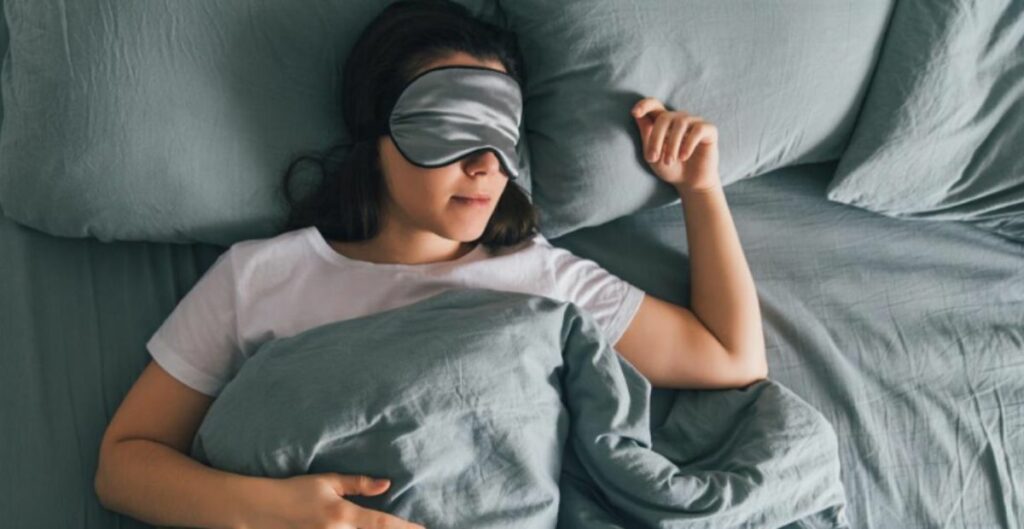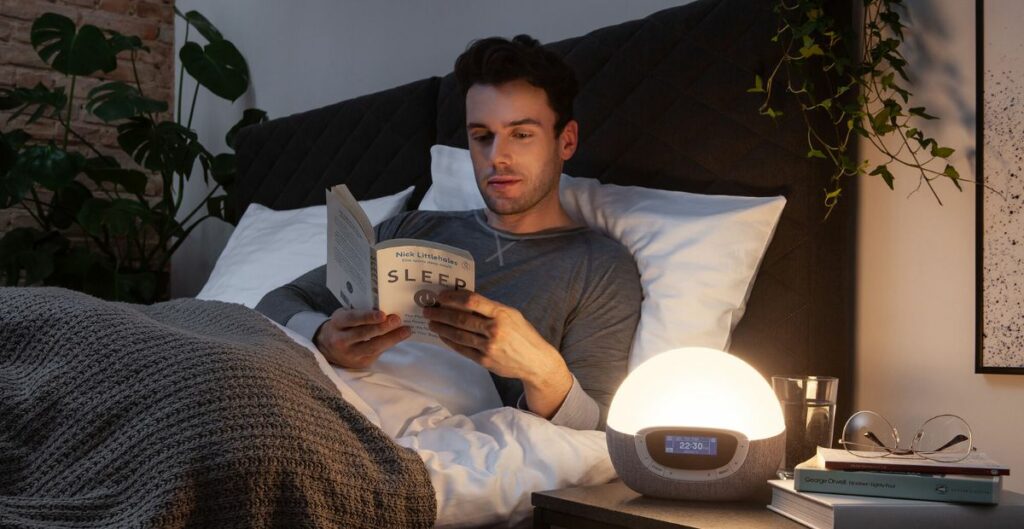Research repeatedly highlights how sleep significantly affects different parts of our lives. It boosts mood, sharpens thinking, and even strengthens our immune system. The advantages of regular, peaceful sleep are incredibly significant.
Sleep of high caliber isn’t a luxury; it’s vital for a wholesome lifestyle.
As we better comprehend the complex link between sleep and well-being, the value of fostering improved sleep routines becomes more evident. It’s not solely about how long you sleep but also about the richness—the depth and rejuvenating essence of those valuable hours.
Exploring the significance of advice and tips for better sleep quality, it’s pivotal to explore how insufficient sleep impacts our physical and mental health.
In This Article
Why It Is Important To Have Tips For Better Sleep Quality Every Night

During sleep, the body isn’t just inactive; it’s actively engaged in vital processes necessary to maintain balance.
Think of it as a restoration period when the body fixes tissues, strengthens memories, and manages hormone levels. Sleep is when the brain deals with emotions, organizes information, and prepares for the upcoming day.
When this important stage is disrupted, it affects our waking moments significantly.
The effects of not sleeping well can be far-reaching and significant. On a physical level, it might show up as feeling tired, weaker immune system, and more prone to getting sick. Mentally and emotionally, it can cause more stress, trouble concentrating, and increased irritability.
Additionally, not getting enough sleep for a long time has been connected to major health problems such as heart disease, obesity, and diabetes. Recognizing how serious these consequences are highlights why having these seven tips for better sleep quality is crucial as part of our overall healthcare routine. Incorporating effective seven tips for better sleep quality can greatly improve these outcomes.
7 Tips For Better Sleep Quality Every Night

Finding it hard to get a good night’s sleep can wear us out. But don’t worry; simple tips can turn those tossing-and-turning nights into refreshing ones. Let’s explore seven effective tips for better sleep quality:
Maintaining A Consistent Sleep Schedule
Establishing a steady sleep routine involves more than simply picking a bedtime and keeping to it—it’s a dedication to your body’s inherent rhythm. Your internal clock functions consistently, aligning to your preferred sleep and wake hours.
Incorporating tips for better sleep quality is crucial here. Begin by setting a bedtime that allows for seven to eight hours of peaceful sleep and strive to uphold it consistently, weekdays and weekends alike. Embracing these tips for better sleep quality assists in quicker sleep onset and improves sleep quality by managing REM cycles.
Your body will adjust and positively react to this regularity, fostering a sense of comfort as bedtime approaches. Additionally, creating a bedtime routine serves as a preparation for sleep. Doing light stretching, reading, or having a relaxing, caffeine-free drink tells your body it’s time to relax.
Consistent and dedicated to these tips for better sleep quality is important; it becomes a cue for your mind and body to shift from awake to falling asleep. Over time, your body will link these tips for better sleep quality with sleep, making the transition smoother and more effective.
Create A Peaceful Sleep Environment

Converting your bedroom into a haven for sleep goes beyond a cozy mattress. Contemplate the room’s atmosphere: softer lighting an hour before bedtime signals your body to unwind.
Enhancing with top-notch blackout curtains or an eye mask efficiently blocks disruptive light, fostering deeper, uninterrupted sleep. Assess your sleeping area’s warmth; a cooler environment, usually within 60 to 67 degrees Fahrenheit, promotes superior sleep quality. This can be accomplished by adjusting thermostats or selecting breathable bedding fabrics.
Moreover, having no disturbances is crucial for good sleep. Remove gadgets from your bedroom because the light they emit messes with the body’s melatonin production, which controls sleep.
Instead, choose calming activities like reading a book, meditation, or listening to peaceful music or nature sounds. Create a calming space that helps you feel peaceful, paving the way for a night of deep sleep.
Unwind With Relaxation Techniques
The busy pace of everyday life can carry stress into bedtime, making it tough to relax and fall asleep easily.
Introducing calming practices into your nightly schedule can help your mind and body prepare for a peaceful sleep. Try activities that calm your nerves and soothe your senses, like mindfulness meditation or progressive muscle relaxation.
Practicing focused breathing is a potent way to calm a busy mind. One effective method involves the 4-7-8 technique: breathe in for four counts, hold for seven, and then exhale for eight.
This approach aids in lessening anxiety and fostering a sense of calm. You might also consider adding gentle yoga or simple stretching to your bedtime routine. These activities ease physical tension and promote mental calmness, setting the stage for a more peaceful sleep.
Before bedtime, taking a warm bath has long been known to help promote sleep. The change in body temperature after a bath naturally encourages sleep, telling your body it’s time to relax. You can improve relaxation by adding lavender or chamomile essential oils, making for a luxurious and soothing way to prepare for a good night’s sleep.
Watch Your Diet And Hydration

The food we eat affects how well we sleep. Eating a big meal before bedtime can make you uncomfortable and disturb your sleep. Instead, go for a small, easy-to-digest dinner at least two to three hours before bed. Spicy or acidic foods might give you indigestion or heartburn, making it hard to sleep well.
Additionally, staying hydrated during the day is crucial for good health, yet finding a balance before bed is important. Dehydration can disturb sleep, and drinking too much liquid just before bedtime might cause you to wake up often to use the bathroom, disturbing your sleep pattern. Strive to drink water regularly throughout the day, gradually reducing your intake as bedtime nears to avoid disruptions during the night.
Besides watching how much you drink, monitoring caffeine intake and implementing tips for better sleep quality are important. Although it perks you up, its influence can last quite a while. Consider following tips for better sleep quality by cutting back on caffeine later in the day to ensure it doesn’t disrupt your ability to doze off easily.
Establish A Bedtime Ritual
Establishing a regular and calming routine before bed is akin to setting a ‘sleep mode’ for your body. Engaging in soothing tasks sends a signal to your mind, indicating it’s time to relax and get ready for sleep. Consider including activities that encourage relaxation, helping you smoothly shift from being awake to entering a state of rest.
Reading a book – preferably something light and enjoyable – is an excellent way to detach from the day’s stressors. Steer clear of stimulating material that might keep your mind racing. Alternatively, journaling can help unload lingering thoughts or worries, allowing your mind to settle before sleep.
Brief guided meditation or deep breathing techniques can remarkably reduce stress and soothe the nervous system. Whether picturing a serene setting or concentrating on your breath, these methods help quiet the mind and prepare it for rest. Regularity in these routines strengthens the link between the habit and upcoming rest, simplifying the transition into a peaceful state conducive to sleep.
Limit Screen Time Before Bed

In our modern world dominated by digital devices like smartphones, laptops, and TVs, we’re encircled by screens emitting blue light. Yet, this light disrupts our sleep cycles significantly. It hampers the creation of melatonin, a crucial hormone governing our sleep routines.
Hence, it’s important to reduce screen use an hour before sleep. Create a digital cut-off and enjoy activities without screens.
As we said above, try reading a book, pursuing a hobby, or chatting calmly with someone dear. Lowering lights and staying away from screens helps signal your body to relax, making it easier to drift into sleep.
Exercise Regularly, But Mind The Timing
Taking part in physical activity significantly impacts one’s general health, influencing the quality of sleep. Regular exercise positively affects how long and well you sleep. However, the timing of these activities is crucial.
Exercising too close to bedtime can heighten your heart rate and energize the body, hampering relaxation. Finishing moderate to intense exercise sessions at least three hours before sleep is advisable. This gives your body sufficient time to ease into a restful state.
Yoga, especially before bedtime, offers valuable tips for better sleep quality. It merges movement and relaxation methods, fostering a sense of calmness and readying your body for sleep—a routine embedded with tips for better sleep quality. Consistent physical activity betters sleep and boosts general health and wellness, embodying one of the most essential tips for better sleep quality.
FAQ’s:
Here are the six frequently asked questions about better sleep quality every night:
Why is sleep quality important, and how does it affect our health?
Why is sleep quality important, and how does it affect our health?
Resting isn’t just a quiet period; it’s an engaged activity that enables our bodies to recuperate and renew. The importance of quality sleep goes beyond morning alertness. It manages vital bodily functions—like hormone production, immune support, and brain operation.
Additionally, good sleep boosts memory, helps learning, and aids emotional balance. On the flip side, insufficient sleep quality is tied to various health problems, such as heightened stress, weakened immunity, and increased chances of conditions like obesity, diabetes, and heart disease.
What habits can I adopt to improve my sleep quality naturally?
What habits can I adopt to improve my sleep quality naturally?
Establishing consistent sleep patterns is vital for ensuring good sleep. Begin by setting a regular sleep schedule, aiming to sleep and wake at consistent times daily, even during weekends. Adopt a calming bedtime routine that tells your body it’s time to relax—this might involve reading, taking a warm bath, or practicing gentle yoga or meditation. Limit screen time, as the blue light from devices can affect the sleep hormone melatonin.
Also, consider your diet and exercise, and create a conducive sleep environment with a comfortable mattress, appropriate room temperature, and minimal noise and light for improved sleep quality.
How do stress and mental health impact sleep quality, and how can they be mitigated?
How do stress and mental health impact sleep quality, and how can they be mitigated?
The quality of our sleep depends greatly on stress and mental well-being. Various stressors, be they work-related or stemming from relationships and other factors, often disrupt our ability to fall asleep and maintain it throughout the night initially. Similarly, issues like anxiety, depression, or post-traumatic stress disorder (PTSD) can notably disturb our regular sleep rhythms.
Practices like mindfulness meditation, deep breathing, or progressive muscle relaxation reduce stress and induce relaxation before bedtime. Seeking guidance from therapists or counselors can also be immensely beneficial in handling mental health concerns affecting our sleep quality.
Is there a correlation between diet and sleep quality?
Is there a correlation between diet and sleep quality?
Your food choices and the timing of your meals can greatly impact your sleep. Steering clear of hefty dinners near bedtime, moderating caffeine and alcohol consumption, and selecting sleep-supportive foods such as nuts, kiwis, or herbal teas can enhance the quality of your sleep.
How does technology affect sleep quality, and how can I create a tech-friendly sleep routine?
How does technology affect sleep quality, and how can I create a tech-friendly sleep routine?
Constantly relying on technology can seriously mess up our sleep. The blue light from screens throws off our body’s sleep cycle.
Creating a tech-free period before bed, using blue light filters, and doing screen-free stuff can help make our sleep routine more tech-friendly and help us rest better.
Are there any alternative remedies or practices that can enhance sleep quality?
Are there any alternative remedies or practices that can enhance sleep quality?
Apart from usual sleep habits, various other methods and techniques offer the potential to improve sleep. Aromatherapy utilizes oils such as lavender or chamomile, inducing a calming influence and aiding relaxation before bedtime.
Engaging in activities like yoga, tai chi, or gentle stretches can alleviate stress, easing the body into a more peaceful state for rest. Alternative treatments like acupuncture, mindfulness stress reduction methods (MBSR), and cognitive-behavioral therapy for insomnia (CBT-I) have proven successful in enhancing sleep quality for numerous people.
Conclusion
When you integrate these practical suggestions into your nightly regimen, achieving a restful night’s sleep is well within reach. Consistency is crucial as you adopt these adjustments. It’s important to be patient while your body adapts to these new patterns, but the payoff of enhanced sleep quality is worth the effort.
The notion of sweet dreams isn’t a distant dream but an attainable reality with a committed focus on a sleep-friendly routine. Embrace these methods, and soon, you’ll peacefully drift into sleep, waking up refreshed and prepared to tackle the day ahead, all thanks to these valuable tips for better sleep quality.
Remember, improved sleep quality isn’t merely a luxury; it’s a vital element of overall wellness. Therefore, start implementing these tonight and pave your way toward a rejuvenating and tranquil sleep experience every night with the help of these effective tips for better sleep quality.
Also Read:







